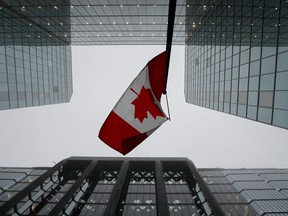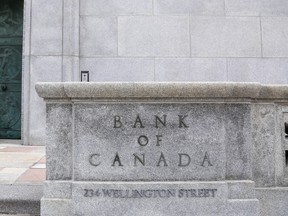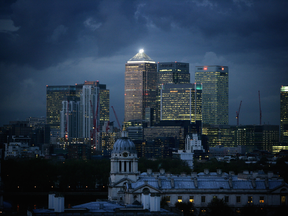Scotiabank economist Derek Holt places the odds of tariffs and retaliation at 60/40
Article content
Retaliation against United States tariffs could hold the key to Bank of Canada‘s moves on interest rates, says a prominent economist.
Article content
Article content
“U.S. tariffs with no retaliation would mean more easing by the (Bank of Canada); U.S. tariffs with material retaliation by Canada could thwart easing and possibly even bring back policy tightening,” Derek Holt, vice-president and head of capital markets economics at the Bank of Nova Scotia, said in a recent note. “And we’ll play scenarios in between when we learn more in the context of fluid, fast-moving developments.”
Advertisement 2
Article content
Donald Trump‘s inauguration as U.S. president is on Jan. 20, and he has pledged to impose 25 per cent tariffs across the board on day one. In preparation of him making good on that threat, Canada has come up with a list of $150-billion worth of U.S. products to put tariffs on, though the targets haven’t been released.
In November, Canada imported $31.8-billion worth of goods from the U.S., representing 53.4 per cent of the $59.5 billion in total imports from the country’s top 15 trading partners.
“It’s hard to have conviction on the path forward for the Bank of Canada because of this tariffs issue,” Holt said in an interview. “If we don’t get tariffs, then our baseline assumption is that maybe we get another quarter- or half-a-point worth of rate cuts.”
The Bank of Canada’s benchmark lending rate currently stands at 3.25 per cent, which is at the top of its neutral range of 2.25 per cent to 3.25 per cent.
“We’re at 3.25 now; maybe we go down three or 2.75, somewhere in that range, but we’re pretty close to where we think you would be balancing conditions and the overall economy,” Holt said.
Article content
Advertisement 3
Article content
If Trump’s tariffs land and Canada doesn’t retaliate, then Holt thinks the Bank of Canada will have to start cutting rates and by a sizable amount, perhaps even into the one per cent range.
The reason being that U.S. tariffs would amount to a tax on Canadian exports, with the additional fallout of creating less demand, resulting in a slowing economy, higher unemployment, more spare capacity and falling inflation.
“The Bank of Canada’s mandate is two per cent inflation, so if they see a weakening economy damaging inflation prospects, then they would be cutting pretty aggressively in this scenario,” Holt said.
On the flip side, dollar-for-dollar retaliation against any U.S. tariffs would result in the Bank of Canada’s policy rate rising two to three percentage points, he said, because “you’re imposing a tax upon your own imports into Canada.”
Canadian households and consumers buy a lot of imported goods and Holt thinks their incomes would be unable to keep pace with rising prices, resulting in people having less money to spend. That could result in a recession, and boost unemployment and inflation.
Advertisement 4
Article content
The Bank of Canada typically reacts to rising inflation by increasing interest rates.
At the moment, Holt places the odds of tariffs and retaliation at 60/40.
Three in five Canadians say they want the Canadian government to retaliate against U.S. tariffs, according to a new Angus Reid Institute poll released on Thursday.
The same number would support a tit-for-tat 25 per cent tariff on all American goods “or a targeted set of tariffs at that level on critical exports.”
Recommended from Editorial
-

BoC expects to end quantitative tightening in first half of 2025
-

What jobs data mean for Bank of Canada and interest rates
But until Jan. 20, the tariff question is a dark hole with the magnitude and duration unknown, Holt said.
“Those are big, big, big question marks, and all our modelling is assuming that there wouldn’t be any carve-outs and that it would be a fairly lengthy, protracted period in which we have to deal with these tariffs.”
• Email: gmvsuhanic@postmedia.com
Bookmark our website and support our journalism: Don’t miss the business news you need to know — add financialpost.com to your bookmarks and sign up for our newsletters here.
Article content
Retaliation against US tariffs could force BoC to hike rates
2025-01-17 11:00:51







